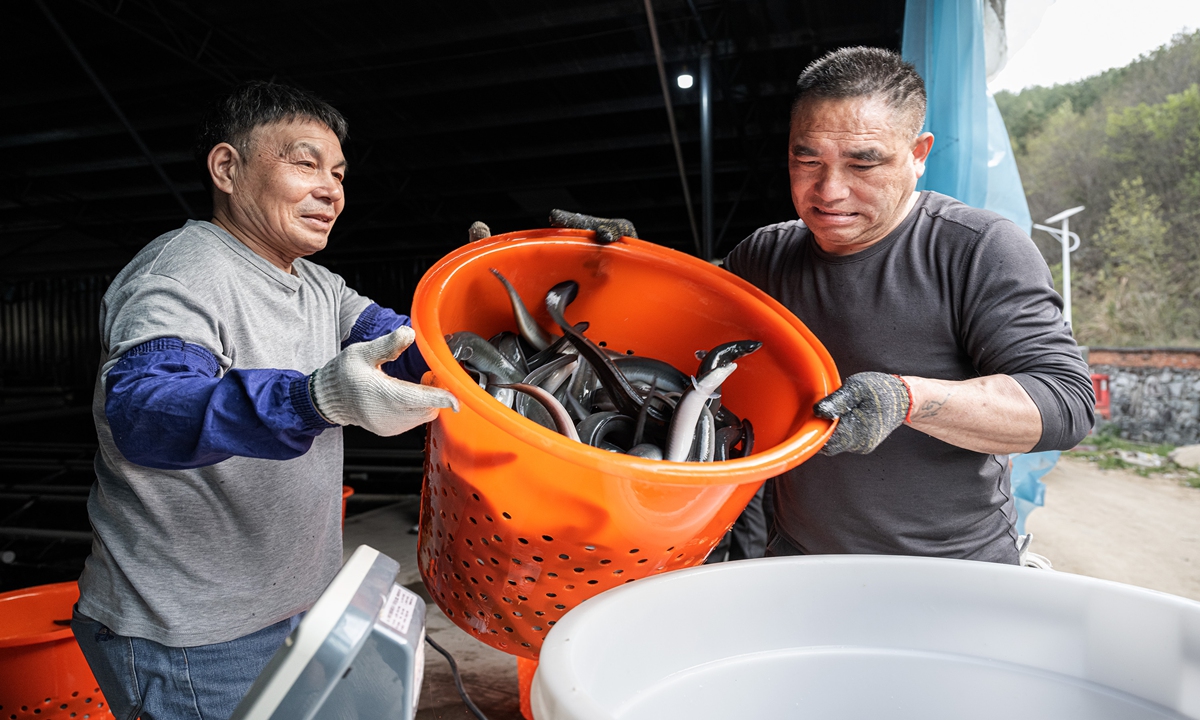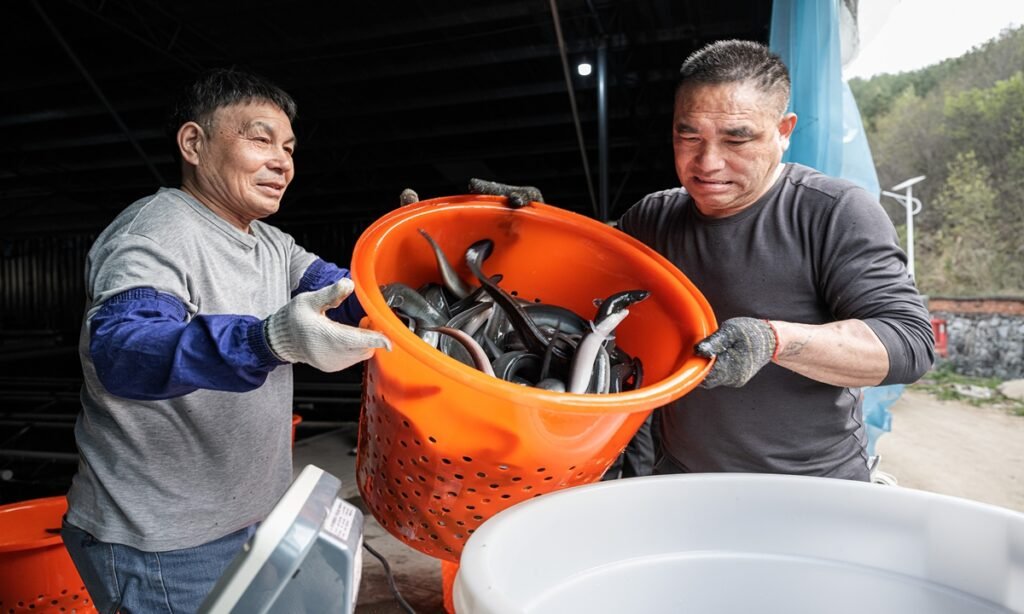
Workers bustle inside an eel-farming base operated by an agricultural technology company in Huanggang, Central China’s Hubei Province, on April 2, 2025. They scoop live eels into buckets, process them, and ship the products to Japan, South Korea, and other markets. Photo: VCG
The 4th China-Japan- the Republic of Korea (ROK) Agricultural Ministers’ Meeting was held in Incheon, South Korea, on Monday, the first such meeting in seven years since it was last held in Beijing in 2018, according to media reports. The trilateral agricultural cooperation dialogue mechanism, which was suspended due to the pandemic, has thus resumed, a development of great significance, according to the Yonhap News Agency.
The trilateral meeting was attended by Chinese Minister of Agriculture and Rural Affairs Han Jun, South Korean Minister of Agriculture, Food and Rural Affairs Song Mi-ryung and Japanese Minister of Agriculture, Forestry and Fisheries Shinjiro Koizumi, according to the Korea Times.
Han said that the latest trilateral meeting was important for sharing best practices among the three countries. He added that the meeting further cemented the three countries as an East Asian cooperative on the back of the ninth trilateral summit, which was held in May last year in Seoul, according to the Korea Times.
“The three countries’ trade in the agricultural field has been on the rise, reaching $19.34 billion in value last year,” Han said. “But global geopolitics is becoming more complicated and climate change is intensifying. Working populations across farmlands in all three countries are aging. To tackle these issues, trilateral cooperation is now back to business. Our fields of partnership will diversify from traditional sectors like disease prevention and agricultural development to smart farming and digital transformation,” the Korea Times reported.
The three parties agreed that the agricultural sector is facing multiple challenges, including the climate crisis, cross-border spread of infectious diseases, and supply chain instability, and reaffirmed the importance of sharing information and working together to address them. They agreed to deepen complementary cooperation based on each country’s core agricultural policies, focusing on areas such as developing smart agriculture technologies, implementing carbon-neutral farming models, and cultivating young agricultural talent, according to the Yonhap News Agency.
“China, Japan and South Korea are among the most advanced agricultural players in the Asia-Pacific, and the sector holds strategic importance in each country’s economic development. With shared interests and an existing trilateral cooperation mechanism, working together is both natural and necessary,” Lü Chao, president and associate professor of Institute of American and East Asian Studies at Liaoning University told the Global Times on Monday.
“For all three, agriculture, forestry and fisheries are matters of national livelihood,” Lü said.
Lü noted that a joint cooperation framework can help address these shared needs, enhance resilience, and ensure the steady development of the sector in the face of common challenges such as climate change, supply chain instability, and the cross-border spread of animal and plant diseases.
“Against the backdrop of US tariff pressure and protectionist measures that have influenced all three countries’ agricultural sectors, deeper cooperation is timely. Food security is a top priority on which the three countries share a clear consensus,” Lü added.
Following the meeting, the three parties issued a joint statement agreeing to hold the agricultural ministers’ meeting on a regular basis and to institutionalize the mechanism to advance sustainable agricultural development and ensure food security. The next meeting will be held in Japan, according to Yonhap.
At the 13th China-Japan-ROK Trilateral Economic and Trade Ministers’ Meeting held in Seoul, Chinese Commerce Minister Wang Wentao said on March 30 that amid the downward pressure on the global economy, China, Japan and ROK, as major regional and global economies, have to make joint efforts to safeguard free trade and the multilateral trading system, oppose unilateralism and protectionism, and advance regional economic integration, according to the Xinhua News Agency.
China is committed to high-quality development and expanding high-level openness, vowing to share opportunities with all nations, including the ROK and Japan, Wang said, according to Xinhua.
This trilateral meeting followed the first such meeting on Jeju Island in 2012, the second in Tokyo in 2015 and the third in Beijing in 2018, the Korea Times reported.
Global Times

